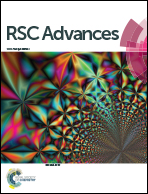Research on epoxy resin decomposition under microwave heating by using ReaxFF molecular dynamics simulations
Abstract
To investigate the effects of microwave heating on decomposing epoxy resin, ReaxFF molecular dynamics simulations are performed. As one of its special effects, the thermal runaway phenomenon is studied and compared under microwave heating and under conventional heating. This study shows that this phenomenon results from the enhancement of system absorption of microwave energy, which is caused by the increasing number of small size polar species generated during the pyrolysis of epoxy resin under microwave heating. Meanwhile, non-thermal effects are investigated under microwave heating. Simulations indicate that, at the early stage of decomposition, average generating rates of H2O and H2 obtained under microwave heating are always, or partly, lower than that obtained under conventional heating. To analyze the influence of microwave heating on reaction rates, collision theory is introduced. Further, several simplified collision models are constructed and formulated to study the effectiveness of collision orientations under microwave heating. Analyses illustrate that external microwave heating reduces the effectiveness of collision orientations between polar hydric fragments as well as hydroxyl radicals and polar hydric fragments, thus, decreasing relevant reaction rates.


 Please wait while we load your content...
Please wait while we load your content...